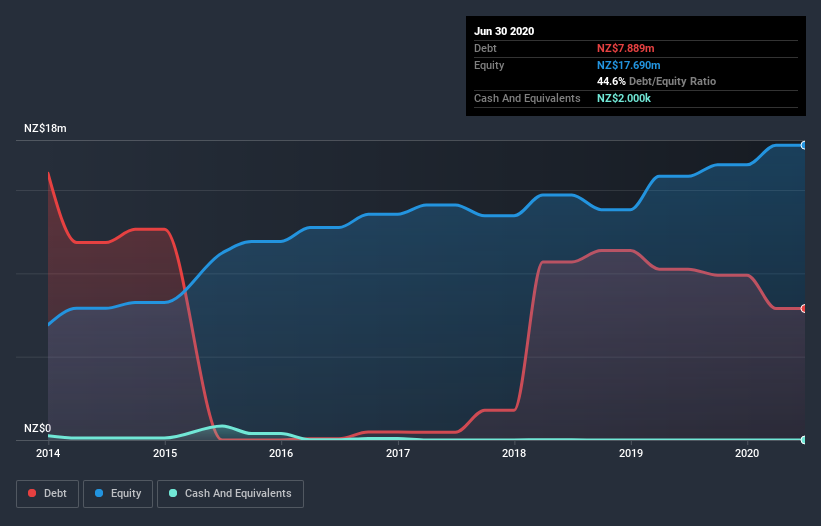
David Iben put it well when he said, 'Volatility is not a risk we care about. What we care about is avoiding the permanent loss of capital.' So it seems the smart money knows that debt - which is usually involved in bankruptcies - is a very important factor, when you assess how risky a company is. We can see that Just Life Group Limited (NZSE:JLG) does use debt in its business. But the more important question is: how much risk is that debt creating?
What Risk Does Debt Bring?
Debt and other liabilities become risky for a business when it cannot easily fulfill those obligations, either with free cash flow or by raising capital at an attractive price. If things get really bad, the lenders can take control of the business. However, a more usual (but still expensive) situation is where a company must dilute shareholders at a cheap share price simply to get debt under control. Having said that, the most common situation is where a company manages its debt reasonably well - and to its own advantage. When we think about a company's use of debt, we first look at cash and debt together.
Check out our latest analysis for Just Life Group
What Is Just Life Group's Net Debt?
You can click the graphic below for the historical numbers, but it shows that Just Life Group had NZ$7.89m of debt in June 2020, down from NZ$10.3m, one year before. And it doesn't have much cash, so its net debt is about the same.

A Look At Just Life Group's Liabilities
We can see from the most recent balance sheet that Just Life Group had liabilities of NZ$6.84m falling due within a year, and liabilities of NZ$8.30m due beyond that. Offsetting this, it had NZ$2.0k in cash and NZ$3.26m in receivables that were due within 12 months. So its liabilities total NZ$11.9m more than the combination of its cash and short-term receivables.
Since publicly traded Just Life Group shares are worth a total of NZ$68.6m, it seems unlikely that this level of liabilities would be a major threat. However, we do think it is worth keeping an eye on its balance sheet strength, as it may change over time.
We measure a company's debt load relative to its earnings power by looking at its net debt divided by its earnings before interest, tax, depreciation, and amortization (EBITDA) and by calculating how easily its earnings before interest and tax (EBIT) cover its interest expense (interest cover). This way, we consider both the absolute quantum of the debt, as well as the interest rates paid on it.
With net debt sitting at just 1.4 times EBITDA, Just Life Group is arguably pretty conservatively geared. And it boasts interest cover of 7.5 times, which is more than adequate. And we also note warmly that Just Life Group grew its EBIT by 14% last year, making its debt load easier to handle. The balance sheet is clearly the area to focus on when you are analysing debt. But it is Just Life Group's earnings that will influence how the balance sheet holds up in the future. So if you're keen to discover more about its earnings, it might be worth checking out this graph of its long term earnings trend.
But our final consideration is also important, because a company cannot pay debt with paper profits; it needs cold hard cash. So we always check how much of that EBIT is translated into free cash flow. During the last three years, Just Life Group produced sturdy free cash flow equating to 78% of its EBIT, about what we'd expect. This free cash flow puts the company in a good position to pay down debt, when appropriate.
Our View
The good news is that Just Life Group's demonstrated ability to convert EBIT to free cash flow delights us like a fluffy puppy does a toddler. And we also thought its EBIT growth rate was a positive. Zooming out, Just Life Group seems to use debt quite reasonably; and that gets the nod from us. After all, sensible leverage can boost returns on equity. The balance sheet is clearly the area to focus on when you are analysing debt. However, not all investment risk resides within the balance sheet - far from it. Consider for instance, the ever-present spectre of investment risk. We've identified 3 warning signs with Just Life Group , and understanding them should be part of your investment process.
At the end of the day, it's often better to focus on companies that are free from net debt. You can access our special list of such companies (all with a track record of profit growth). It's free.
When trading Just Life Group or any other investment, use the platform considered by many to be the Professional's Gateway to the Worlds Market, Interactive Brokers. You get the lowest-cost* trading on stocks, options, futures, forex, bonds and funds worldwide from a single integrated account. Promoted
New: Manage All Your Stock Portfolios in One Place
We've created the ultimate portfolio companion for stock investors, and it's free.
• Connect an unlimited number of Portfolios and see your total in one currency
• Be alerted to new Warning Signs or Risks via email or mobile
• Track the Fair Value of your stocks
This article by Simply Wall St is general in nature. It does not constitute a recommendation to buy or sell any stock, and does not take account of your objectives, or your financial situation. We aim to bring you long-term focused analysis driven by fundamental data. Note that our analysis may not factor in the latest price-sensitive company announcements or qualitative material. Simply Wall St has no position in any stocks mentioned.
*Interactive Brokers Rated Lowest Cost Broker by StockBrokers.com Annual Online Review 2020
Have feedback on this article? Concerned about the content? Get in touch with us directly. Alternatively, email editorial-team@simplywallst.com.
About NZSE:JLG
Just Life Group
Engages in the provision of filtered water solutions to business and residential customers in New Zealand.
Good value with mediocre balance sheet.
Market Insights
Community Narratives




